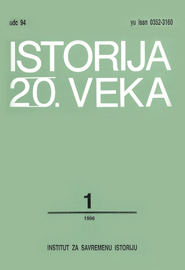JUGOSLAVIJA I JEVREJSKE IZBEGLICE 1938-1941.
JEWISH REFUGEES IN YUGOSLAVIA 1938-1941
Author(s): Milan RistovićSubject(s): Jewish studies, Recent History (1900 till today), Interwar Period (1920 - 1939), WW II and following years (1940 - 1949), Fascism, Nazism and WW II, History of the Holocaust, History of Antisemitism, Migration Studies
Published by: Institut za savremenu istoriju, Beograd
Keywords: Kingdom of Yugoslavia; Jews; Jewish refugees; interwar period; WWII; emigrants; refugees;
Summary/Abstract: The geographical position of the Kingdom of Yugoslavia made it one of the principal transit stations for thousands of Jewish emigrants and refugees who passed through it from 1933 onwards and who made it their sanctuary for various lengths of time. The entire human and material resources of the small Jewish community in Yugoslavia were employed in receiving and aiding these people, with only partial assistance from international Jewish and non-Jewish humanitarian organizations. The attitude of Yugoslav authorities towards Jewish refugees and emigrants from central European countries in the period between 1938 and 1941 was largely determined by factors in foreign politics and their effect on the policy of the Yugoslav government. Changes in the system of issuing entry or transit visas for Yugoslavia depended on changes in the legislation of countries from which the emigrants, refugees and »tourists« of Jewish origin came. Pressure was exerted on the Yugoslav government, mainly by Germany, to alter the status of the domestic Jewish community. Consequently, in 1940 several regulations were introduced which seriously undermined the Jews’ equal status in the Kingdom of Yugoslavia. On the other hand, demands were also made by the British to prevent the use of Yugoslav territory for the transit of Jewish emigrants going to Palestine, which was then under British rule. A part of the dilemma regarding the treatment of Jews, coming primarily from Germany, Austria and Czechoslovakia, can be found in the work of inter-ministerial government conferences, in the statements and attitudes of the highest-ranking government authorities, of influential individuals, members of the Jewish community and representatives of some branches of trade who held a chiefly pragmatic interest in the problem of refugees (tourist organizations, transportation companies etc.) The attitudes which surfaced in discussions held at various levels regarding the issue of refugees were not uniform, their variety demonstrating the complexity of the problem. Government measures, in accordance with »solutions« whose purpose was to turn away the oncoming stream of refugees, were mostly restrictive and were applied, with varying severity, by all countries forced to serve as temporary or permanent sanctuaries to hundreds of thousands of homeless Jews. These attitudes indicate the general atmosphere of the time immediately preceding the horrors of war and the tragedy not only of several million European Jews but, likewise, of millions of non-Jews. They are also proof of the political and moral weakness of the world, which neither defied the anti-Semitic politics of Nazism nor wished to receive the victims of these politics and offer them shelter and security.
Journal: Istorija 20. veka
- Issue Year: 1996
- Issue No: 1
- Page Range: 21-43
- Page Count: 23
- Language: Serbian

